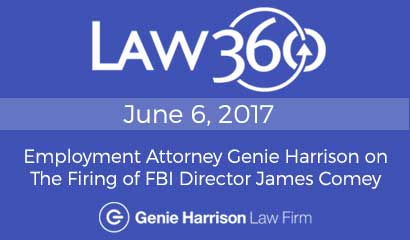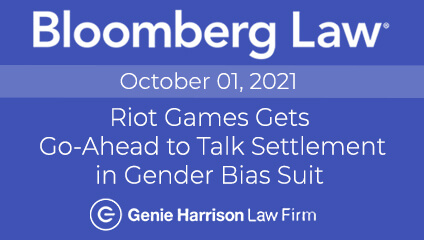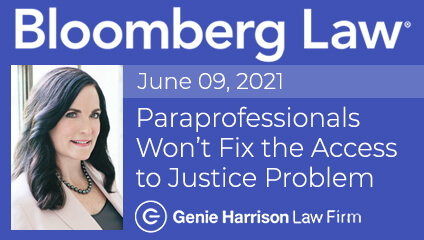When Your Boss Isn’t Decent Enough to Say, ‘You’re Fired’
June 6, 2017 – by Genie Harrison for Law360.com
As America watched, FBI Director James Comey joined the ranks of 7.1 million unemployed workers last month when President Donald Trump fired him halfway into his 10-year term. Comey’s termination was sensational, as was the way it happened.
Trump didn’t call Comey into a private meeting to hand him his pink slip. Instead, the president announced the termination through the press. Comey only learned of it through television news reports in the background of his address to FBI employees.
It’s ironic that Trump who, up until a couple of years ago, was perhaps best known for telling reality star performers to their faces that they were fired, extended no such courtesy to the director of the FBI.
Comey joins a long list of people who have been fired publicly. In 1988, Vogue Editor-in-Chief Grace Mirabella found out she’d been canned via a TV news report. AOL Chief Executive Tim Armstrong fired a top employee during a conference call in 2013, when the staffer tried shooting his photo.
As an employment attorney who has handled cases throughout Southern California over more than 20 years, I have seen nearly every type of scenario imaginable when an employer and an employee part ways. Particularly in light of how Trump has frequently left the earth scorched in his tracks, I cannot say I was surprised when I heard how Comey met his fate.
Many Americans are no doubt asking “could this happen to me?” The simple answer is yes — there’s no law saying your boss can’t fire you in a public spectacle that leaves you completely humiliated. But, if your boss fires you for an illegal reason or lies about your actions or performance, he exposes the company to significant liability.
There are state and federal laws that limit the reasons why an employee can be fired. These include anti-discrimination laws (like California’s Fair Employment and Housing Act or Title VII), anti-retaliation and whistleblower protections (like Sarbanes- Oxley), and other important state public policies. Defamation laws limits how terminations occur.
Why You Won’t Get Fired Like Comey
Most wrongful termination cases involve rank-and-file employees who have been fired for an illegal reason. Then you have the headline- grabbers: sports stars and coaches, celebrities, and business moguls. Often, these types of employees have protections that were negotiated as part of their employment contracts, which average employees do not have. These protections may include regulating the manner and terms of termination, such as specifying how much notice is provided, what type of public announcement is made, and compensation. And sometimes even without such contractual protections, the termination is managed for PR purposes.
For example, former Fox News CEO Roger Ailes was ousted in July 2016 without any real explanation. While the media was rife with allegations that Executive Chairman Rupert Murdoch and his sons were fed up with the bad publicity and multi-million-dollar payouts over numerous sexual harassment allegations, none of this was officially stated. Rather, Fox said Ailes resigned and praised his “remarkable contribution.”
Even the slightly messy firing of Fox’s star host Bill O’Reilly, after numerous women disclosed sexual harassment settlements and advertisers fled, was handled with decorum, as both sides offered praise and good wishes for the other. Ailes received $40 million in compensation and O’Reilly $13 million, according to media reports.
Most of us won’t have the luxury of such a generous severance package on our way out the door, nor will our termination be accompanied by grandiose statements about our contribution to the company’s success. Rather, most folks can expect a closed-door meeting with a superior, a witness from HR, and a simple statement that “we’re letting you go.”
That’s because any statement made by an employer during termination is potential evidence that an unlawful motive could exist or could potentially be defamatory.
The Gray Area: Vindictiveness and Defamation Leading to Job Loss Can Be Illegal
Obviously Comey is an “at will” employee, but even ”at will” employees have rights, as long as their boss isn’t the president of the United States.
The law is fairly clear on issues of race, religious affiliation, gender or age discrimination. If those illegal reasons are substantial factors in the termination of employment, liability can result.
For the average employer, acting with vindictiveness (aka malice) or defaming an employee in the termination process opens up another avenue for potential liability. In general, defamation occurs when a false, unprivileged statement is made that injures a person in his occupation, by imputing general disqualification, exposing him to hatred, ridicule, contempt or shame, or discouraging others from associating or dealing with that person, leading him to suffer harm in his business, profession or occupation.
The vindictiveness with which Trump fired Comey was apparent just by making public the former director’s termination letter. It appears to have been done purely for theatrics.
Trump’s displeasure was apparent when he told Lester Holt in a televised NBC News interview that Comey was “a showboat” and “a grandstander.” Trump went on to say that the FBI was in turmoil and, “He’s the wrong man for that position,” as well as saying that Comey “was not doing a good job.” However, Comey was a respected long-time law enforcement officer who had a stellar career up until the last presidential election, Trump’s disparaging comments were clearly made to try to sway public opinion, with an apparent disregard for the contrary opinions reportedly held by many inside the FBI. Unfortunately for Comey though, the president is likely to get a free pass for his apparently defamatory statements.
According to the U.S. Supreme Court’s decision in Nixon v. Fitzgerald, 457 U.S. 731, 744748 (1982), Trump would have needed to show that the president “is entitled to absolute immunity from damages liability predicated on his official acts,” as a function of the “President’s unique office, rooted in the constitutional tradition of separation of powers and supported by our history.” One cannot help but think that Comey knows full well that he will never see Trump in court. Instead, it looks like he hopes to expose the president’s conduct through testimony in congressional hearings.
Defamatory statements, similar to those made by Trump about Comey, can lead to significant liability for most employers. That’s why lawyers counsel employers to give no reason for the termination of employment and not to say anything negative about terminated employees after they are gone. In summary, the chosen few at the top of the food chain have a wide spectrum of firing experiences, ranging from being the last person in America to learn you don’t have a job to getting a severance package equivalent to the GDP of several small countries. For the rest of us, there are rules to play by, and it behooves all of us to be familiar with them and act with decorum.
Genie Harrison is lead trial attorney at the Genie Harrison Law Firm in Los Angeles.
The opinions expressed are those of the author(s) and do not necessarily reflect the views of the firm, its clients, or Portfolio Media Inc., or any of its or their respective affiliates. This article is for general information purposes and is not intended to be and should not be taken as legal advice.





